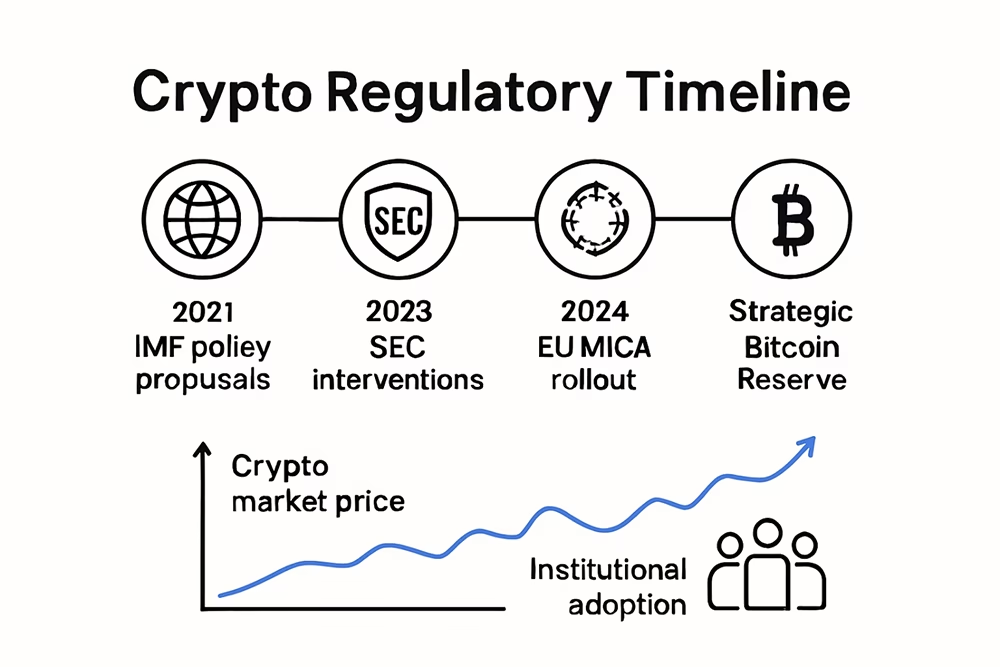
Global financial regulators are tightening their grip on the crypto world and the effects are impossible to ignore. Crypto asset markets have seen returns drop as much as 12 percent in a single week after key regulatory announcements. Sounds like a death knell for Bitcoin and digital assets right? Actually the new wave of global regulations is forcing crypto markets, miners, and big corporations to rapidly evolve in ways that could reshape the entire financial system. Get ready to rethink what you thought you knew about the future of crypto.
| Takeaway | Explanation |
|---|---|
| Regulations Affect Crypto Sentiment | Cryptocurrency markets react sharply to regulatory announcements, causing market volatility and investor anxiety. |
| Mining Standards Are Evolving | Bitcoin mining operations must now adopt stricter compliance and invest in energy-efficient technology to meet regulatory demands. |
| Corporate Strategies are Shifting | Companies are increasingly adopting Bitcoin as a reserve asset, influenced by new regulatory frameworks and compliance requirements. |
| Enhanced Compliance Mechanisms Required | Organizations must implement advanced risk management protocols and tracking systems to align with ever-changing regulations. |
| Global Coordination is Essential | Effective integration of cryptocurrencies into finance requires coordinated global regulations to ensure safety, innovation, and investor protection. |
The global financial landscape is experiencing a profound transformation as regulatory bodies worldwide grapple with the complex challenge of integrating cryptocurrencies into existing financial frameworks. Global financial regulations are no longer theoretical discussions but critical mechanisms that directly influence the trajectory of digital assets.
The Regulatory Pressure Point
Cryptocurrency markets are increasingly feeling the weight of comprehensive regulatory scrutiny. The International Monetary Fund emphasizes the critical need for coordinated policies that address potential risks associated with crypto assets. These regulations aim to protect investors while preventing potential systemic financial disruptions.
The regulatory approach is multifaceted. Governments and financial institutions are developing frameworks that balance innovation with risk management. Market sentiment and investor confidence dramatically shift with each regulatory announcement, demonstrating the profound impact of these global financial regulations on cryptocurrency ecosystems.
Research provides clear evidence of the significant market impact triggered by regulatory actions. A detailed study examining the US Securities and Exchange Commission’s interventions revealed that crypto asset markets can experience substantial volatility following regulatory announcements. The study found that returns can plummet up to 12% within a week of a significant regulatory event, with market reactions persisting for extended periods.
The European Union’s Markets in Crypto-Assets Regulation (MiCA) represents another critical example of how global financial regulations are reshaping crypto markets. Financial experts warn that while these regulations aim to provide structure, they might inadvertently create new systemic risks, particularly around stablecoin fungibility across different jurisdictions.
Regulatory bodies are increasingly recognizing that cryptocurrencies cannot exist in a governance vacuum. The emerging approach involves creating nuanced, adaptive frameworks that can accommodate the rapid technological evolution of digital assets. This means developing regulations that protect investors, prevent financial crimes, and simultaneously support technological innovation.
Key focus areas include establishing clear guidelines for crypto exchanges, implementing robust know-your-customer (KYC) protocols, and creating transparent mechanisms for tracking digital asset transactions. The goal is not to stifle innovation but to create a safer, more predictable environment for cryptocurrency investments and transactions.
As global financial regulations continue to evolve, cryptocurrency markets will likely experience ongoing transformation. Investors, technologists, and regulators must collaborate to create frameworks that balance innovation, security, and financial stability. The next few years will be crucial in determining how effectively the global financial system can integrate and regulate these groundbreaking digital assets.

The regulatory landscape for Bitcoin mining and equipment is undergoing significant transformation, with global financial regulations directly influencing operational strategies, equipment procurement, and investment decisions in the cryptocurrency mining sector.
Recent government actions signal a more structured approach to digital assets. The White House Executive Order establishing the Strategic Bitcoin Reserve represents a critical milestone in federal engagement with cryptocurrency infrastructure. This strategic move demonstrates an unprecedented level of governmental involvement in managing digital assets.
The BITCOIN Act of 2025 further illustrates the evolving regulatory framework. By proposing a Strategic Bitcoin Reserve and mandating transparent management of federal Bitcoin holdings, the legislation could fundamentally reshape Bitcoin mining operations and equipment investments.
Regulatory changes are compelling Bitcoin mining companies to adapt quickly. Compliance requirements are becoming increasingly complex, necessitating significant investments in advanced mining equipment that meets emerging standards. Miners must now consider not just computational efficiency, but also energy consumption, environmental impact, and regulatory alignment.
Equipment manufacturers are responding by developing more sophisticated mining hardware that can withstand potential regulatory scrutiny. This includes developing miners with enhanced energy efficiency, improved traceability features, and built-in compliance mechanisms.
| Regulatory Requirement | Impact on Bitcoin Mining Companies | Adaptation Strategies |
|---|---|---|
| Stricter Compliance Standards | Increased need for regulatory reporting | Invest in compliance infrastructure |
| Energy Efficiency Mandates | Demand for environmentally-friendly operations | Upgrade to energy-efficient equipment |
| Environmental Impact Assessment | Monitoring and reducing carbon footprint | Adopt sustainable mining practices |
| Enhanced Transparency & Traceability | Improved tracking of equipment and processes | Implement advanced auditing and monitoring |
| Robust Governance Structures | Need for transparent management | Establish professional governance systems |
| Regional Regulatory Variations | Operational complexity across jurisdictions | Adjust geographic presence accordingly |
The regulatory environment is pushing the Bitcoin mining industry towards greater professionalization. Companies must now demonstrate robust governance structures, transparent financial reporting, and commitment to sustainable practices. This shift is driving consolidation in the mining sector, with smaller, less compliant operators potentially being pushed out of the market.
International variations in regulatory approaches will likely create complex operational landscapes for mining companies. Some jurisdictions may offer more favorable regulatory environments, potentially leading to geographic shifts in mining activities.

Explore our comprehensive mining research to understand how these regulatory dynamics are reshaping the Bitcoin mining ecosystem. The intersection of technological innovation, regulatory frameworks, and economic incentives will continue to define the future of Bitcoin mining and equipment development.
As global financial regulations become more sophisticated, Bitcoin miners must remain agile, anticipating and adapting to changes that will fundamentally transform the cryptocurrency mining landscape. The next few years will be critical in determining which mining operations can successfully navigate this complex regulatory environment.
The intersection of stock markets, Bitcoin treasuries, and regulatory compliance is experiencing a profound transformation in 2025, driven by increasingly sophisticated global financial regulations that are reshaping how corporations and financial institutions approach digital assets.
Corporate approaches to Bitcoin and cryptocurrency are evolving rapidly. The Strategic Bitcoin Reserve established by presidential executive order represents a significant milestone in institutional cryptocurrency adoption. This strategic move signals a growing acceptance of Bitcoin as a potential reserve asset for government and corporate entities.
Regulatory compliance has become a critical consideration for companies exploring Bitcoin treasury investments. Corporations must now navigate complex regulatory landscapes that demand unprecedented levels of transparency, risk management, and financial reporting.
The Securities and Exchange Commission continues to play a pivotal role in defining the regulatory environment. Recent SEC guidance has created significant market volatility, with cryptocurrency markets experiencing substantial price fluctuations following regulatory announcements. The classification of most cryptocurrencies as securities has profound implications for stock market interactions and corporate treasury strategies.
Interestingly, the Federal Reserve’s withdrawal of previous guidance on crypto-asset activities in April 2025 indicates a more nuanced approach to digital asset regulation. This suggests a potential shift towards more flexible and innovation-friendly regulatory frameworks.
| Regulatory Event/Action | Main Impact | Resulting Trend/Adjustment |
|---|---|---|
| Presidential Executive Order (Strategic Reserve) | Increased institutional cryptocurrency adoption | Corporations reassess reserve strategies |
| SEC Guidance on Crypto Securities | Significant market volatility, new classification risks | Treasury/stock market strategies evolve |
| Federal Reserve Withdrawal of Previous Guidance | Indication of more flexible, innovation-friendly stance | Companies anticipate regulatory shifting |
| MiCA Regulation (EU) | Enhanced structuring, but possible new systemic risks | Compliance focus, monitoring cross-border |
Companies are increasingly developing sophisticated compliance mechanisms to navigate the complex regulatory environment. This involves implementing robust risk management protocols, enhanced due diligence processes, and advanced tracking systems for digital asset transactions.
Dive deeper into our regulatory research to understand the intricate dynamics shaping Bitcoin treasuries and compliance trends. The landscape continues to evolve, with corporations and financial institutions adapting to increasingly complex regulatory requirements.
The convergence of stock markets, Bitcoin treasuries, and regulatory compliance represents a critical frontier in financial innovation. Companies that can successfully balance technological advancement with rigorous regulatory adherence will likely emerge as leaders in this transformative period. As global financial regulations continue to mature, the relationship between traditional financial systems and digital assets will become increasingly sophisticated and interconnected.
Global financial regulations are causing increased market volatility and influencing institutional adoption of cryptocurrencies. Regulatory announcements can lead to significant price fluctuations, impacting investor sentiment and market dynamics.
Regulations are pushing Bitcoin mining operations to adopt stricter compliance measures and invest in energy-efficient technologies. Miners must align their practices with emerging standards to avoid legal repercussions and ensure sustainability.
The Strategic Bitcoin Reserve, established by the U.S. government, signals a significant shift in how digital assets are viewed by institutions. It suggests a growing acceptance of Bitcoin as a reserve asset among governments and corporations, impacting their treasury strategies.
Corporations should implement robust compliance mechanisms, including risk management protocols and enhanced tracking systems, to navigate complex regulatory environments effectively. Staying informed about regulatory changes is crucial for adapting treasury strategies involving Bitcoin and other digital assets.
Uncertainty in global financial regulations can make Bitcoin mining feel like a moving target. As described in this article, sudden compliance changes and equipment requirements leave many institutional investors and miners unsure about their next step, especially when returns can disappear overnight. You need more than knowledge—you need real solutions that adapt as quickly as the regulatory environment does.

Blockware Solutions specializes in hosted and concierge Bitcoin mining designed for a world of complex, evolving rules. With our Mining-as-a-Service and research-backed support, you access fast hardware deployment, ROI tools, and the hands-on guidance needed to remain compliant and efficient. Don’t let regulations disrupt your plans—visit Blockware Solutions now and discover how you can start mining with confidence today.